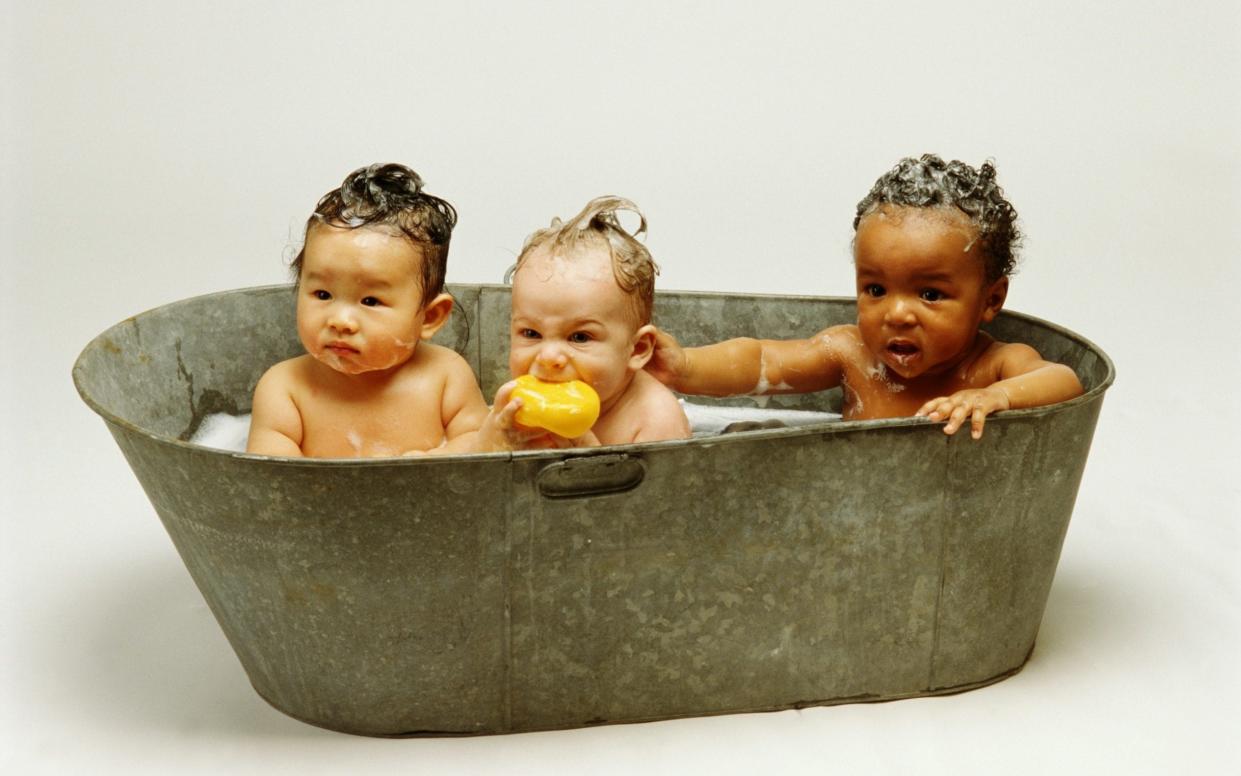Too clean for their own good? The science of how often we should wash our children

With the world obsessed with hygiene, it was a breath of fresh air to hear Ashton Kutcher and Mila Kunis reveal their laidback attitude towards family cleanliness.
Appearing on an episode of Dax Shepherd’s Armchair Expert podcast, celebrity couple Kutcher and Kunis revealed they barely washed their two children, Wyatt, 6, and Dimitri, 4, when they were newborns and lived by the motto: “If you can see the dirt on them, clean them. Otherwise there’s no point.”
The couple went on to say they only washed their “bits” every day with Kunis putting it down to the way she grew up. "I didn't have hot water growing up as a child, so I didn't shower much anyway. But when I had children, I also didn't wash them every day. Like, I wasn't the parent that bathed my newborns – ever.”
At last! A sane parental voice emerges from the chorus of germaphobe masses otherwise consumed with hand gels and Dettol wipes as a result of the pandemic.
Thanks to the celebrity couple, I now feel I can come out of the closet and say that I too don’t hassle my two children for a daily full-body wash. Hands, face and teeth is my bedtime mantra and if a few days have passed without a shower, so what? Not only does it save on precious water but isn’t a bit of old-fashioned dirt good for them?

Medical microbiologist Dr Lisa Cross seems to think so: “Many studies have shown that in the hunter/gatherer times of the past when people were washing less and lived so much more in nature and rolled around in the mud, our skin microbiome was much more diverse than it is now,” she explains. “This bacterial diversity on our skin is good for us because it means there’s less room for pathogens – bad bacteria – to land on our skin, which can cause infections or create potential for disease.”
Dr Cross refers to an experiment she conducted as part of a television programme where people who went to a festival and didn’t wash for a few days were swabbed before they went in then at the end. “It showed they had more diverse bacteria by not washing which is a good thing,” she explains.
Dr Cross does, however, believe that the practice of targeted washing – like the Kutcher and Kunis family ascribe to – is a sensible one.
“If you don’t wash your bits regularly then you could be increasing the chances of getting a potential infection, such as a urinary tract infection, so that is advised,” she says. “Handwashing too – whether with soap and water or hand gel – is important, especially with the highly transmissible Covid now among us, but also because we’re regularly putting our hands into our mouths and touching people and surfaces, and potentially spreading pathogens.”
While famous germaphobes like Donald Trump and Robbie Williams are most likely furious full-body-washers, a white paper published this month by the International Scientific Forum on Home Hygiene on “What we can learn from the Covid-19 pandemic?” attests that “targeted hygiene” is of paramount importance in the 21st century to prevent infectious diseases and this means focusing hygiene at the times and in the places that matter most.
The white paper goes on to list nine key moments in our daily lives where harmful microbes are most likely to be spreading and they include during food handling, looking after our pets, when eating with our fingers or when coughing, sneezing and nose-blowing – but no mention is made of the need to be scrubbing ourselves top to toe religiously every day.
In fact, a past white paper by the same Scientific Forum attested that we run a risk of being too wash-conscious and that a lack of exposure to microbes – microorganisms that include healthy and unhealthy bacteria, fungi and viruses – in our natural environments is now being associated with rising levels of allergic diseases such as asthma, eczema and food allergies, as well as autoimmune diseases, inflammatory bowel disease, type 1 diabetes, and more.
“Dirt can be good for us,” argues Dr Cross. “Research has even shown that dirt has a microbiome that may double up as an antidepressant which would explain why gardeners are always happy. Our health depends on the flourishing microbiome in our guts – and on how much of the natural world’s microbiome we let infiltrate. Research has shown that the common, harmless soil bacteria, Mycobacterium vaccae, sends chemical messages to your brain which has an effect on your mood and makes you happier.”
Well, if that’s not a good enough reason to get your children rolling around in dirt this summer – and not washing it off afterwards – I don’t know what is.

 Yahoo News
Yahoo News 
